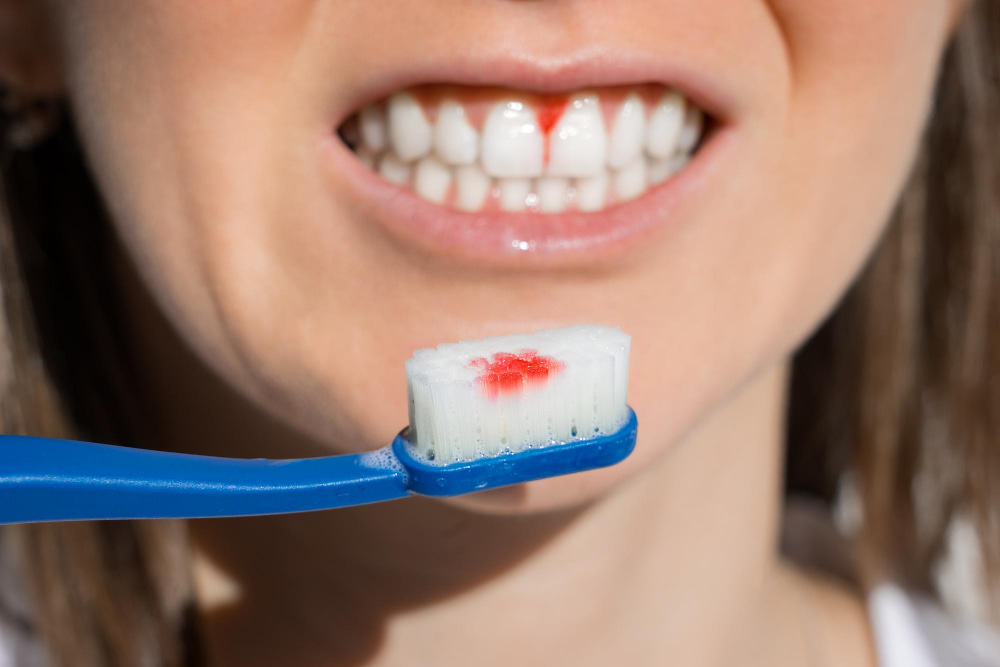

Bleeding gums are a symptom of diseases that occur primarily in the gums. However, apart from gum diseases, the underlying cause may also be other health problems. Harsh tooth brushing, incorrect use of dental floss, and mistakes in using dentures can cause bleeding in the gums. In addition to routine daily problems, bleeding gums may also indicate chronic conditions such as diabetes, hemophilia, and low platelet count in the blood.
Gums or also known as gingiva; It is a mucosa tissue that surrounds the teeth and acts as a protective barrier. It helps grind food by settling firmly into the bone tissues it surrounds. It prevents food residues from passing into the periodontal areas. The color of the gums is coral pink in healthy individuals.
Gums have a tissue rich in blood vessels. If the vessels in the gum tissue are damaged due to internal and external factors, people experience bleeding gums. The most common cause of bleeding gums is excessive plaque accumulated in the gums. The sticky bacterial plaque called gingivitis that occurs after this accumulation causes inflammation in the gums. These plaques cause bleeding in the gums. Excessive plaque accumulation can lead to bleeding as well as a jaw bone condition called periodontitis. These disorders negatively affect people's oral health. The treatment of this disorder, which negatively affects the person's health and may have different sub-causes, should be started as soon as possible under the supervision of a dentist.
The most important cause of gum bleeding is inadequate oral hygiene and gingivitis inflammation. Chronic diseases or vitamin deficiencies should be examined in case of constantly recurring gum bleeding. The most necessary thing to prevent bleeding gums is to learn the causes of this problem thoroughly.
Physical Trauma: Hard and shelly foods consumed by patients or external damage to the tooth structure may cause gum bleeding.
Intraoral Prosthesis: People using dentures or oral prostheses that do not fit their mouth structure can damage teeth and gums and cause gum bleeding.
Pregnancy: Hormonal changes during pregnancy cause edema in the gums or excessive blood flow to the gum area. Pregnant women may experience bleeding gums due to these changes in hormones.
Chronic Diseases: Chronic diseases that damage the gums, such as diabetes, blood clotting problem (hemophilia), decrease in the number of platelets in the blood, can cause gum bleeding.
Vitamin deficiencies; Vitamins C and K are very important for the health of gum tissues. Vitamin C is indispensable for the connecting tissues surrounding the teeth and jaw bones. Vitamin C contributes to the development of tissues in the body and accelerates the healing of tissue wounds. Vitamin K deficiency causes problems in blood clotting, which can cause bleeding disorders. As a result of people taking insufficient vitamins C and K, their gums may be affected by vitamin deficiency. Therefore, foods rich in vitamins C and K should be consumed.
Bleeding gums while brushing teeth is the most common symptom experienced by people. When a person thinks that he or she is experiencing gum bleeding for no reason, there is actually an underlying reason. This may be due to harsh use of dental floss and toothbrush or bad nutrition habits.
One of the frequently seen factors that causes bleeding gums is oral hygiene.
Oral Hygiene Habit: Failure to perform oral and dental care regularly and with tools suitable for the tooth structure, or neglecting it, may damage the gums. If you do not brush your teeth regularly, your oral hygiene is poor.
Gingivitis: It is the inflammation that occurs in the oral dental tissue. Inflammation of the gums is one of the most common causes of bleeding gums.
Smoking: The chemicals used in cigarette production damage the gum structure by damaging it. Damage to the gum can make the gum prone to bleeding.
Many different diseases can cause bleeding gums, not only oral hygiene habits or diseases caused by inflammation of the gums.
The most common symptom seen by people is blood on the gums during tooth brushing, on the toothbrush or in the water after rinsing the mouth. Additionally, tooth sensitivity is another symptom. Pain in the gums due to hot and cold sensitivity, pressure on the gums, turning of the gums from pink to red, swelling in the gums, and excessive pressure on the gums due to dental dentures are the main symptoms of gum bleeding.
Symptoms other than bleeding gums can be listed as follows:
Such symptoms may vary depending on the underlying cause of gum bleeding and may occur together with bleeding.
Brush your teeth at least twice a day, in a way that does not damage the capillaries and tooth tissue.
You can keep your mouth hygienic by using dental floss and mouthwash solutions.
The vitamin content in the body is possible with a balanced diet. Therefore, for good oral and dental health, you should regularly consume foods rich in vitamins K and C. Also, drink plenty of water during the day to prevent inflammation of the gums that may occur due to dry mouth.
Stop smoking and alcohol. Because these bad habits damage the gum structure.
See your dentist regularly to have your dentures checked and smile aesthetics.
While gum bleeding may start while brushing your teeth and stop within a few seconds, it may also be caused by inflammation. Since dental disorders can also lead to cardiac problems, gum health should be taken into consideration, especially in pregnant women.
Vitamin C and K deficiency in people can cause the immune system to weaken and the durability and healthy structure of tissues and vessels to deteriorate. This situation affects gum bleeding.
You can contact our customer representatives to get more information about our gum treatment and other treatment methods.